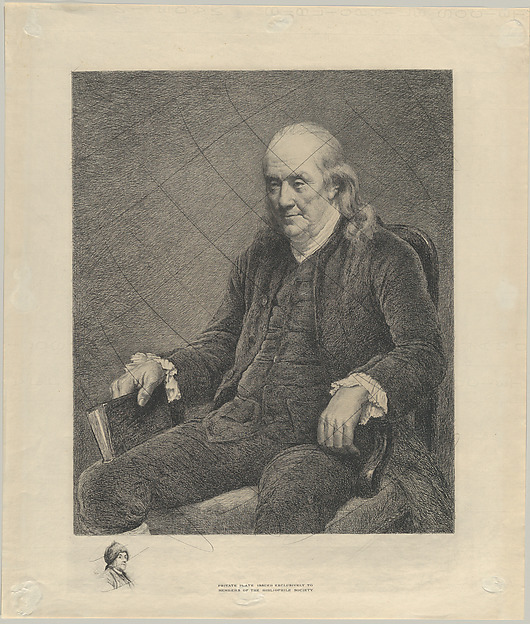
The era that de Crevecouer and Benjamin Franklin were writing Letters from an American Farmer and Poor Richard’s Almanac was during the time of Enlightenment. This is a period when discussions on religion were fading from everyday life to a focus on reason. This era was full of philosophical thought to have reasoning dictate why humans are superior to beasts, the ability to be moral without a religion requiring it. This period was also when Americans were trying to understand their culture in this new world, where they didn’t need to be a country that was representative of European countries, but could be their own new place. This necessity for a new American identity was caused by the American Revolution. This context illustrates the purpose behind Franklin and de Crevecouer’s writings, the necessity of forming a new identity as a country.
Benjamin Franklin’s Poor Richard’s Almanac was written under the pseudonym Richard Saunders starting in 1733 (Franklin 456). The almanac is famous for its many axioms about wealth and life that are easy to remember and helped define the hard work ethic of many Americans at the time. Specifically, the prologue to Poor Richard Improved is entitled “The Way to Wealth,” a topic that is especially interesting to the new Americans who no longer have to share the majority of their output with a ruling aristocracy. With their new-found freedom, the Americans would especially appreciate the idea of frugality and hard work as a way to wealth, as that particular idea was not common in Europe where leisure was envied.
De Crevecouer’s Letters from an American Farmer was written in London to explain the ideology of the new American. This appealed to the Europeans very much, the idea that the colonists didn’t want to form new colonies but rather a new country. In his work, de Crevecouer created the term “Ubi panis ibi patria” as the motto for the emigrants of America. This term means “Where there is bread, there is one’s Fatherland” (de Crevecouer 607). It plays into the idea of the colonists being proud of hard work and how their own hard work is equally and equitably paid out to them without a master class taking an undeserved portion.
Franklin and de Crevecouer both illustrate this notion of hard work being something to strive for, not something to be ashamed of. It becomes a sort of calling card of pride to the new Americans, as it allows everyone of different backgrounds to melt together. By being united by the love of hard work and frugality, their backgrounds are no longer relevant. They have the innovative spirit that is needed to create a new country, and American innovation cannot come without hard work. Franklin and de Crevecouer recognize this and are attempting to show the world why America is special to them, albeit in different ways. They have pride in the new America and want to show how Americans are reacting to the Enlightenment period through their relaxation of religious requirements and observation of a hard work ethic.
Works Cited
De Crevecouer, John. “Letter III: What is An American.” The Norton Anthology of American Literature, edited by Nina Baym, W. W. Norton & Co., 2011, 605-614.
Franklin, Benjamin. “The Way to Wealth.” The Norton Anthology of American Literature, edited by Nina Baym, W. W. Norton & Co., 2011, 456-463.
“William Harry Warren Bicknell | Benjamin Franklin | The Met.” The Metropolitan Museum of Art, I.e. The Met Museum, www.metmuseum.org/art/collection/search/757703.